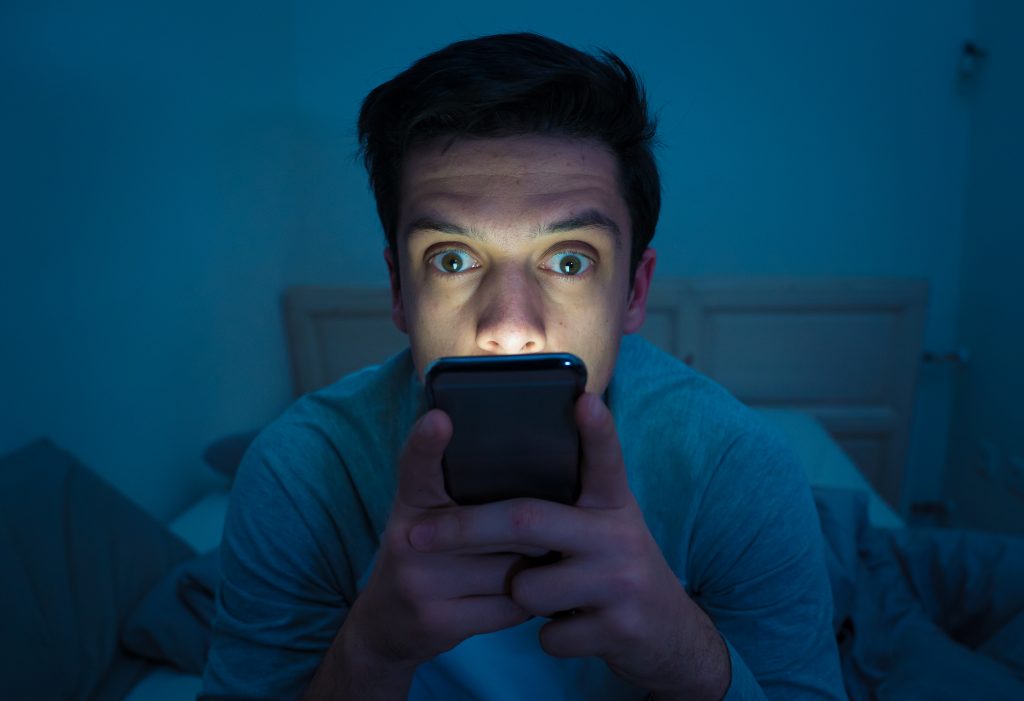Let’s start with the basics guy: Are you Addicted to technology?
We are all familiar with substance addiction to alcohol and narcotics, but what about the addiction to a specific behavior? Addiction is characterized by the inability to refrain from rewarding experiences consistently.
Today a great majority of Americans own at least one smartphone designed to make their professional and personal life efficient, entertaining, and easy. Today’s use of phones do, for many, what personal assistants used to do. From managing our schedules, recording our meetings, and tracking what we eat to knowing where our children are, cell phones are almost impossible to live without.
Are you addicted to your smartphone?
As recent studies have demonstrated, our brain experiences an increase of the neurotransmitter hormone dopamine and glutamate in the “pleasure center,” a region of our brain involved in reward and pleasure, every time our phones chime with a message. Think Pavlov Dog, a term used in psychology to describe an early 1900’s experiment showed that the brain (and the gut) react to the sight of something desirable. In his experiment with dogs, Pavlov, the Russian researcher, noticed that dogs, his subjects, would start salivating in anticipation of feeding. This normal reflex response applies to many other situations, including the chiming sound of a new message on your phone when our brains “jump into action” even before seeing what the message is all about.
The neurotransmitters’ surge is not different from the so-called ‘high’ that drug addicts experience when “zooming out” after taking recreational drugs. This “phone high” has caught the attention of drug rehab facilities, which in turn have developed specific programs to help “phone addicts” cope with both the addition and its side effects, such as poor posture, stress, anxiety, and depression that are emblematic of withdrawal.
Cell phone addiction is so common today that I suspect that soon cell phone addiction will be listed in the Diagnostic and Statistical Manual of Mental Disorders.
How about Erectile Dysfunction (ED)? Is there a Link with Cell Phone Use?
In 2013, a small study by Cairo University and the Medical University of Graz in Austria published in the Central European Journal of Urology showed a link between cell phones and ED. The study assessed the use of cell phones and ED in a group of 20 men. The authors concluded that men who carry their cell phones switched on in their pocket increased their risk of developing ED. The study was designed to take into account the participants’ age, body type, and testosterone levels, making sure that they were the same across the board to eliminate any possibility that these were contributing factors. The actual time spent talking on the cell phone proved not to be relevant in assessing ED. Carrying the phone in their pocket with the switch on was the culprit.
In addition, also according to research increased cell phone use can lead to anxiety and, consequently, ED, due to the constant and compulsively checking messages and being “on” for an excessively long period.(www.ncbi.nlm)
Is sperm count affected by excessive cell phone use?
YES! As early as 2005, research has shown that men who had higher use of cell phones also had reduced sperm count and inferior sperm quality than those who use their cell phones less. The study concluded that the lowest average sperm counts were in men with the highest cell phone use (more than four hours per day). In contrast, men with the lowest amount of cell phone use a day had the highest sperm count.
(www.webmd.com/). A more recent study in 2017 tittle the effect of cell phone usage on semen quality and fertility among Jordanian males published in the Middle East Fertility Society Journal showed the same results.(www.sciencedirect.com/journal)
So, guys, I bet you’re turning off your phones right now as you read this. As you should!
Addicted to the Office – “Unplugging” from Work
Recently, there have been several studies, and articles focused on how to make employees feel happier, healthier, more in control, and, hence, more productive. Job titles such as “Chief Happiness Officer,” pets being welcomed into the office, and on-site meditation have emerged in many social media postings.
But are these measures indeed leading to work happiness and increased productivity?
Not really. While these measures may express a company’s values and give the employees a sense that their employer cares, they do not solve the stress of unplugging from work. Voice messages, texts, and emails pile up while the employees are trying to relax via meditation or yoga. This is all thanks to the rise of smartphones, which can yank us back to work. Anytime. Anywhere.
What’s the solution?
An increasing number of companies have started to suggest, or even mandate, ways in which employees should unplug their connected devices.
Software that auto-deletes employee email while they are on vacation is now available. Servers that stop mobile email service 30 minutes after quitting time until 30 minutes before starting time have also come online. Europe has intervened a step further: last January, the French government decreed that people at companies with more than 50 employees can no longer be expected to answer email during their off-hours- a policy dubbed “the right to disconnect.”
These measures may sound dramatic and possibly impractical, but there is data to suggest they are needed. A recent study from Colorado State University found that “anticipatory stress” means that just thinking about having to answer email at home makes employees feel emotionally exhausted, which in turn affects morale. Some recent studies have found that limiting the amount of time checking emails by 50% can reduce stress levels while almost doubling overall productivity.
But making all these changes can only be successful if employees themselves modify their habits. As we witness every day by merely checking how much time people spend on social media, disengagement can be very challenging to implement. That is, the current social norm is for us to be “connected” all the time. From the governments advising their citizens via cell phones about impending weather dangers to a child being kidnapped, cell phones have become an essential part of life, a tapestry of our everyday existence. That has led some marketing researchers to suggest that what compounds the problem is that people don’t want to be the odd one out and that some employers may think less of employees who decide not to answer phone calls or emails off duty.
For example, working parents rely on cell phones to monitor their children during work hours to make sure they’re doing their homework and after-hours to make sure they’re safe. This has to occur even if they’re at work, making their ability to “stay off the grid” even harder. According to a recent survey by the American Psychological Association, parents and other working people feel that being able to check work email at home makes it easier to get more done; many also felt it improved their relationships with colleagues. That is likely why efforts to impose blanket rules – like Intel’s Quiet Time, a 2008 experiment in which a group of employees cut off their means of communication for one morning a week – haven’t gotten more traction.
What to do then?
- Encouragement and flexibility without prohibition: Ask yourself: do I really need to be on the phone, check emails, or social media surfing right now. Is it better for my body to stretch, walk around for a few minutes, do something to improve my health?
- Self-monitoring: How about, for example, adding a self-imposed schedule to your being “connected’. Say from 10 PM to 6 AM on weekdays and all day on the weekend.
- Avoid the “Sunday night blues” That’s when you go to bed Sunday night anxious and already emotionally depleted. If that’s happening, it’s a sign of work-life imbalance and needs to be changed very quickly before you become “Dis-EASED”
- Get OFF the grid more often and do other -technology-free fun, ride taking a walk, riding a bike, dancing…
- And Eat a well-balanced meal, for your health, for your brain, and your erection.
- Get professional help If you feel you cannot stop the cycle of addiction to technology.
Dr. Edison de Mello is the Akasha Center’s Founder and Chief Medical Officer, you can schedule an appointment with him by calling 310-451-8880 or emailing us at info@akashacenter.com.
Sources:
- The Center for Internet and Technology Addiction: https://virtual-addiction.com/
- Psychalive: https://www.psychalive.org/cell-phone-addiction/
- Time Magazine: https://time.com/4643015/unplug-work-happiness/
- Yoo YS, Cho OH, Cha KS. Associations between overuse of the Internet and mental health in adolescents. Nurs Health Sci (2014) 16:193–200.10.1111/nhs.12086 [PubMed] [CrossRef]
- Hassanzadeh R, Rezaei A. Effect of sex, course, and age on SMS addiction in students. Middle East J Sci Res (2011) 10:619–25.
- Tavakolizadeh J, Atarodi A, Ahmadpour S, Pourgheisar A. The prevalence of excessive mobile phone use and its relation with mental health status and demographic factors among the students of Gonabad University of Medical Sciences in 2011-2012. Razavi Int J Med (2014) 2(1):e15527.10.5812/rijm.15527



















